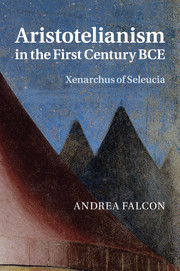Reception
Published online by Cambridge University Press: 05 January 2012
Summary
Xenarchus and the reception of aristotle’s physics in antiquity
Xenarchus’ criticism of the thesis that the heavens are made of a special simple body, unique to them, was preserved and passed on to late antiquity by Alexander of Aphrodisias. Alexander is ultimately responsible for its integration into the ancient commentary tradition. The role that Xenarchus plays in this tradition can be usefully contrasted with the one played by Eudemus of Rhodes. Eudemus was not only a direct pupil of Aristotle; with the exception of Theophrastus, he was also the most prominent Peripatetic philosopher of his time. What we know about his Physics suggests that Eudemus followed the sequence of topic discussed in Aristotle's Physics very closely – so closely that it is tempting to consider him an interpreter (exegetês) of Aristotle's Physics. Because of what is perceived as loyalty to Aristotle, his views are often cited by Simplicius in his commentary on Aristotle's Physics. There, Eudemus is regarded as an exegetical aid in the exposition of Aristotle's text. By contrast, Xenarchus is treated as an adversary whose objections are to be answered in order to reaffirm the transcendence of the heavens. It is telling that his affiliation to the Peripatos is not recorded by Simplicius. This silence is symptomatic of the role that Xenarchus ended up playing in the commentary tradition. Seen through the lens of a pro-Aristotelian exegesis that ultimately goes back to Alexander of Aphrodisias, Xenarchus played the outsider within the Peripatetic tradition. This role does not do full justice to Xenarchus – or so I have argued.
A study of the reasons which may have led a Peripatetic philosopher like Xenarchus to criticize Aristotle's celestial physics helps us to better appreciate how unusual Aristotle's conception of the natural world was in antiquity. Several aspects of this conception were strongly resisted. But nothing generated more controversy than Aristotle's views on the material composition of the heavens. The mixed reception of these views indicates that his conception of the celestial world was truly exceptional, if not even anomalous. When we say that for Aristotle the natural world consisted of a celestial and a sublunary part, we do not do full justice to his position. In antiquity it was common to think of the celestial world as a somehow special region of the world. Stability and incorruptibility were often given as its differentiating features. In fact, the position recommended by Aristotle was much stronger than a generic commitment to the incorruptibility and stability of the celestial world. Aristotle was committed to the existence of material discontinuity between the celestial and the sublunary regions of this world. The so-called fifth substance or fifth body is not just different from earth, water, air, or fire. At least for Aristotle, this substance cannot be reduced to any of them. The expressions “fifth body” and “fifth substance,” which Aristotle never uses in his writings on natural philosophy, are themselves an indication of how many, if not most, people felt about Aristotle's celestial simple body in antiquity. They felt that this was an additional body, or an additional substance, alongside earth, water, air, and fire whose theoretical necessity was at best very dubious.
- Type
- Chapter
- Information
- Aristotelianism in the First Century BCEXenarchus of Seleucia, pp. 167 - 198Publisher: Cambridge University PressPrint publication year: 2011



